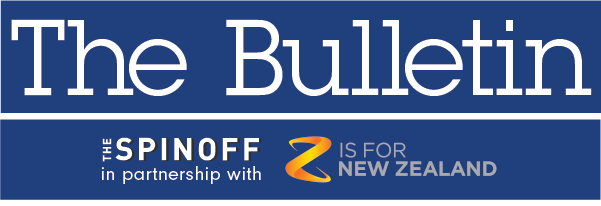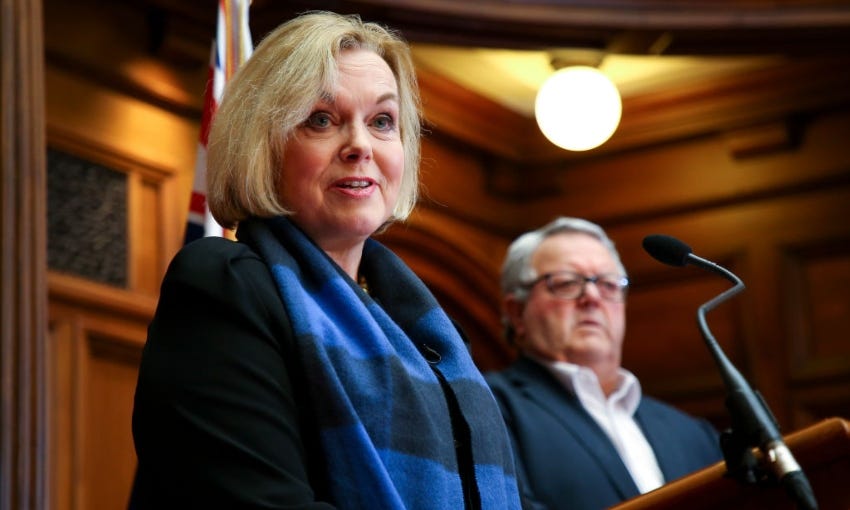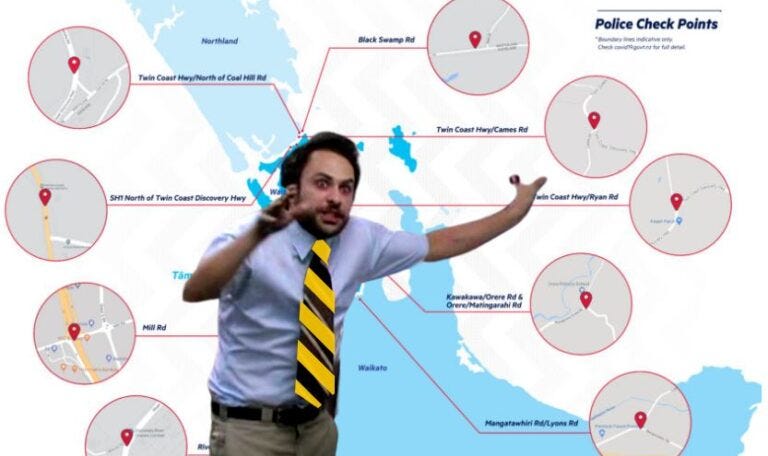National wants a delayed election. Might they have a point?
Voting can still go ahead in the current situation. But that's only part of why elections matter

Good morning and welcome to The Bulletin for Thursday 13 August, by Alex Braae for The Spinoff. Presented in partnership with Z Energy.
In today’s edition: Collins calls for a delay in the election, an update on community transmission and testing, and businesses fearing the fallout of another lockdown.

Image: Judith Collins and Gerry Brownlee at their press conference (Getty Images)
At this stage, the election is still scheduled to take place on September 19. But with the country's largest city currently in level three lockdown, and level two restrictions currently in place around the rest of the country, the window to have any sort of campaign period is rapidly closing. The Electoral Commission yesterday released an update on their website saying that matters around the change in alert levels are being assessed, with more updates coming as more information becomes available. As mentioned yesterday, they have also already made extensive preparations to make the voting process itself safe and socially distanced.
However, the actual voting bit is only one part of the election. The campaign period is also deeply important. It allows voters to assess the suitability of the candidates who are seeking to govern them, and forces those candidates to make statements which they can subsequently be held to account on and measured against. It almost looks silly when written out in such basic terms, but this is fundamental to the nature of legitimacy in a representative democracy. Many local MPs win their seats in large part because they knock on more doors and shake more hands than their opponents, which is frankly dangerous during a pandemic.
As such, calls have been made for a delay in the election date. One particularly loud call came from National leader Judith Collins, who in a press conference with deputy Gerry Brownlee sprinkled some legitimate points in with some incorrect assertions on constitutional matters, and some strange and conspiratorial speculation about whether the government knew about the new cases long in advance. In terms of the former, she noted that National had suspended their campaign, cancelled their campaign launch for this weekend, and effectively are currently unable to freely present their ideas to the public. By contrast, the Labour Party (and particularly Jacinda Ardern) will dominate the airwaves in the coming weeks by virtue of holding the position of prime minister. Incumbency always has advantages, of course, but this is on a very different level.
Earlier in the day, PM Ardern delayed the scheduled dissolution of parliament until next Monday at least. As electoral law expert Andrew Geddis explains, that gives an opportunity for the election to be delayed if needed. There are even various ways by which an election could take place amid a localised outbreak – voting could be suspended or extended for several days at certain polling booths, or put other voting methods in place, like an expansion of the existing mail voting system. Those decisions would be made by the chief electoral officer, rather than by a politician.
Later in the afternoon, Ardern expressed frustration at the call from Collins, reports Stuff. She also accused the opposition leader of playing politics with the response, in a press conference that was also widely covered by major news outlets. As this piece from Justin Giovannetti captures, her campaign was also totally derailed by this, having been out on the trail when it all broke. We're likely to know more about the decision in the coming days – and it is likely to be heavily informed by a situation that is still evolving and unpredictable.
In terms of the situation on the ground with Covid-19: Four probable cases have been linked to the four confirmed positive cases announced on Tuesday night. There have been no further confirmed or probable cases of potential community transmission to report. The possibility has been raised that the outbreak does not stem from the border as such, but from a cold storage importing facility where one of the confirmed cases works. But even so, it seems highly probable that there are as yet unseen cases out in the community, and that if testing rates had been higher, they might have been spotted earlier, as this analysis from the NZ Herald's Derek Cheng points out.
Intensive testing has now been taking place especially in Auckland, but also at sites around the country. Checkpoints have also been established around Auckland's borders, with only essential travel allowed through. Our live updates guy Stewart Sowman-Lund put in a titanic shift yesterday, and you can follow the day's developments by scrolling through it.
On the subject of masks: They're now being "strongly encouraged" for everyone venturing outside in Auckland, along with anyone outside of Auckland who is unable to socially distance – for example, on a crowded bus. Angela Cuming has put together an excellent guide for what you need to know about buying or making a mask, so that it actually works. And some news a lot of you will be able to use – Sam Brooks has written some instructions for mask-wearing so that glasses don't get fogged up.
Businesses in Auckland are seriously worried about the effect the lockdown will have. BusinessDesk (paywalled) reports they have been advised to control what they can, and keep lines of communication with staff strong. Even closing for a few days (if in fact the period at level three does only last until Friday) will have significant impacts on revenue for many. For a view of how this is affecting people on the ground in South Auckland, this piece from Justin Latif is absolutely must-read – it captures a sense of both nervousness about what is coming, and a resoluteness to get through it.
An announcement which we are absolutely delighted to be making: Policy is back for the 2020 election. It is a remarkable tool for elections that captures what candidates stand for, wherever they are and whichever party they're part of. Here's a launch post explaining more by Toby Manhire, but because it works so intuitively, it's almost better to just jump in and start exploring.
It's not exactly a new position for the National party, but earlier this week Judith Collins reaffirmed a commitment to harsh measures against gangs. A series of positions were announced, largely modelled off the law and order document released last year – including a specialist police unit to crack down on gangs, along with tougher punishment and parole conditions for gang offenders. A headline-grabbing part of it all is that a National government would ban all gang patches and insignia from public places, reports the NZ Herald.
Would that work? It really depends on what the purpose is. If it is about preventing people from being intimidated by the sight of gang members, then perhaps, yes. If the aim is to prevent gang members from carrying out acts of crime and intimidation against people, then it's hard to see how it would make a difference. It is a point that has often been made by expert Dr Jarrod Gilbert, for example to Hawke's Bay Today in relation to a cemetery being vandalised by gang members last year. He said it would conflate two largely separate issues:
"Damage at a cemetery is despicable, and if that occurred we ought to hold people to account for that of course," he told Hawke's Bay Today. "But I am not entirely sure how removing gang patches would have prevented it."
A new aspect of their policy platform which is particularly interesting is a proposed "Clean Start" initiative. This would basically be a grant to allow newly released prisoners the option of moving away from where they lived before being incarcerated. It would initially take place as a trial, and would have the aim of being a "circuit breaker" for people to leave gang life, if they chose to.
A committee report into Pacific aid has called for more transparency and communication around individual funding decisions, reports Laura Walters for Newsroom. MFAT has consistently been rated by outside observers as not particularly transparent, but the organisation says it has put proactive measures in place already to address this. One point of transparency that was highlighted as important – it allows governments and NGOs to line up and coordinate their work better.
Got some feedback about The Bulletin, or anything in the news?
Drop us a line at thebulletin@thespinoff.co.nz

Right now on The Spinoff: In Covid stuff – Siouxsie Wiles & Toby Morris explain how genome sequencing could crack the case of the NZ Covid comeback. I interview an expert about why mathematical modelling is such an important tool when data on the extent of the outbreak is limited. Michael Andrew writes about ways to support small businesses at this time. Toby Manhire is just asking questions about Gerry Brownlee, who is also just asking questions. Emily Writes tackles some bad takes in the aftermath of the outbreak.
And in non-Covid stuff: Alice Snedden explores how her views on sex work have changed over time. Gillian Boyes from the Financial Markets Authority breaks down the basics of finding a financial advisor. And Odessa To’o writes about Selina Tusitala Marsh’s picture book Mophead, which was just named the Margaret Mahy Book of the Year.
In sport, a lot of fixtures that were meant to be on this weekend will now not be played. All three ANZ Premiership matches that were scheduled for this weekend have been declared as draws – it wouldn't have made a difference to places in the finals anyway. And in terms of Super Rugby, as of last night the NZ Herald was reporting that the Blues vs Crusaders game was in "major doubt" – it seems fair to assume that the fixture in Auckland won't be going ahead, though the other fixture might. In broader terms, there's a lot of other rugby due to begin this month, and it would be hard to bet on that all coming together without a hitch.
That's it for The Bulletin. If you want to support the work we do at The Spinoff, please check out our membership programme




